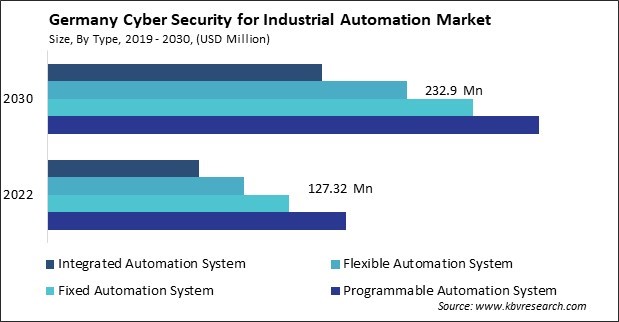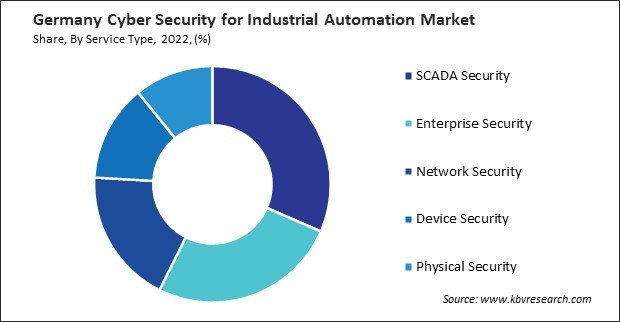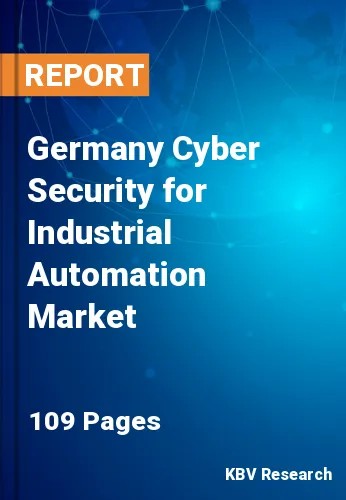The Germany Cyber Security for Industrial Automation Market size is expected to reach $1 billion by 2030, rising at a market growth of 7.3% CAGR during the forecast period.
The cyber security for industrial automation market in Germany is undergoing significant evolution, driven by the rapid digitization of industrial processes and the increasing interconnectedness of industrial systems. As one of the leading economies in Europe, Germany boasts a robust industrial sector that spans manufacturing, automotive, energy, and other critical infrastructure segments. With the proliferation of Industry 4.0 technologies, such as IoT devices, cloud computing, and data analytics, industrial automation systems have become more vulnerable to cyber-attacks. As a result, there is a pressing need for robust cyber security solutions tailored to the unique requirements of industrial environments in Germany.

In response to these challenges, the cyber security for industrial automation market in Germany has experienced significant growth in recent years. Many companies, from established players to innovative startups, offer specialized products and services to secure industrial control systems, SCADA networks, and other critical infrastructure components. These solutions encompass a variety of technologies, including intrusion detection systems, firewalls, encryption tools, and security analytics platforms, designed to detect, prevent, and mitigate cyber threats in real time.
Moreover, the German government and regulatory authorities have enhanced cyber security standards and regulations within the industrial sector. Initiatives such as the National Cyber Security Strategy and the Industry 4.0 Cyber Security Guidelines provide frameworks and best practices for safeguarding industrial automation systems against cyber-attacks.
However, the COVID-19 pandemic has introduced new challenges and uncertainties to the cyber security for industrial automation in Germany. The widespread shift to remote work and virtual collaboration has expanded the attack surface for cyber criminals, as employees access industrial systems from unsecured home networks and personal devices. Moreover, the increased reliance on digital technologies and online services has created opportunities for phishing scams, malware infections, and other cyber threats targeting individuals and organizations.
The food and beverage industry in Germany stands at the forefront of embracing cyber security measures within industrial automation. One primary catalyst for heightened cybersecurity awareness in the German food and beverage industry is the stringent regulatory environment. As a member of the European Union, Germany adheres to regulations such as the General Data Protection Regulation (GDPR) and the Network and Information Security (NIS) Directive. Compliance with these regulations necessitates robust cybersecurity measures to protect sensitive data and ensure uninterrupted operations.
According to Germany Trade & Invest, the food processing industry ranks as the third-largest sector in Germany and showcased strong growth in 2019. The sector demonstrated robust performance with an approximate production value of USD 221.7 billion for processed food and beverages. This surge underscores the increasing adoption of cyber security solutions within Germany's food and beverage industry, particularly in industrial automation.
Moreover, the proliferation of interconnected industrial systems and the advent of Industry 4.0 technologies have expanded the attack surface for cyber threats. With automation playing an integral role in optimizing production, monitoring supply chains, and enhancing efficiency, ensuring the security of these interconnected systems becomes paramount. The food and beverage industry recognizes that cyberattacks target industrial control systems (ICS).
Additionally, high-profile cyber incidents across various industries have underscored the need for proactive cybersecurity strategies. The German food and beverage sector has witnessed many cyber threats, ranging from ransomware attacks to supply chain compromises. Therefore, the German food and beverage industry's prioritization of cybersecurity is driven by stringent regulations and the increasing prevalence of cyber threats targeting industrial systems.
The proliferation of industrial sensors in the cyber security for industrial automation market in Germany represents a paradigm shift in safeguarding critical infrastructure and manufacturing processes. Germany, renowned for its robust industrial sector, is witnessing an unprecedented integration of sensor technologies to fortify its industrial automation systems against cyber threats. Industrial sensors serve as the frontline defense mechanism, constantly monitoring and gathering data from machinery, production lines, and other industrial assets.
One key driver behind the rising utilization of industrial sensors in Germany's cyber security framework for industrial automation is the escalating sophistication of cyber threats. With the advent of Industry 4.0 and the Industrial Internet of Things (IIoT), industrial systems have become increasingly interconnected, amplifying the attack surface for malicious actors. In response, industries are turning to sensor-driven solutions to enhance cyber resilience.
Additionally, the growing awareness among industrial stakeholders about the potential ramifications of cyber breaches has spurred investments in sensor-based security solutions. Recognizing the imperative of securing industrial processes against cyber threats to ensure operational continuity and safeguard intellectual property, organizations are allocating substantial resources toward deploying advanced sensor technologies.
Furthermore, the convergence of industrial automation with emerging technologies like artificial intelligence and machine learning augments the efficacy of sensor-based cyber security measures. These technologies enable predictive analytics and adaptive threat detection, empowering industrial enterprises in Germany to proactively identify and neutralize cyber threats before they escalate into full-blown attacks. Hence, integrating industrial sensors into Germany's cyber security framework represents a proactive response to escalating cyber threats, bolstering the resilience of its critical infrastructure and manufacturing processes.

Germany, renowned for its engineering prowess and manufacturing excellence, is at the forefront of industrial automation cybersecurity. One of the prominent players in the German cyber security for industrial automation market is Siemens AG. As a global leader in industrial automation and digitalization, Siemens offers a range of cybersecurity solutions designed to protect industrial control systems (ICS) and supervisory control and data acquisition (SCADA) systems from cyber threats. Their offerings include industrial firewalls, intrusion detection and prevention systems, and security management platforms, all integrated into a unified ecosystem for holistic security management.
Another key player is Bosch Security Systems, a division of Bosch Group specializing in providing security solutions for industrial environments. Bosch Security Systems offers a comprehensive portfolio of cybersecurity products and services tailored for industrial automation, including network security appliances, endpoint protection solutions, and secure remote access technologies. Their solutions help organizations safeguard their critical infrastructure against cyber-attacks and maintain operational continuity.
ABB Group is also a significant player in the German cyber security for industrial automation market. Leveraging its power and automation technologies expertise, ABB offers cybersecurity solutions specifically designed for industrial control networks and systems. Their offerings include industrial firewall appliances, secure remote access solutions, and anomaly detection systems to help organizations detect and respond to cyber threats in real time, ensuring the reliability and safety of industrial operations.
In addition to these larger players, several specialized cybersecurity firms in Germany focus specifically on industrial automation security. For example, Rhebo specializes in cybersecurity solutions for industrial control systems, offering anomaly detection, network monitoring, and asset inventory management tools tailored for critical infrastructure sectors such as energy, manufacturing, and transportation.
Secunet Security Networks AG is another notable player in the German cyber security for industrial automation market, offering a range of products and services to protect industrial networks and control systems from cyber threats. The company's cybersecurity solutions include network security appliances, encryption technologies, and security consulting services designed to help organizations mitigate risks and ensure compliance with industry regulations. Thus, Germany's cyber security for industrial automation market is characterized by a strong ecosystem of companies offering innovative solutions to address the evolving threats facing critical infrastructure sectors.
By Type
By Security Type
By End Use
By Technologies
Our team of dedicated experts can provide you with attractive expansion opportunities for your business.

